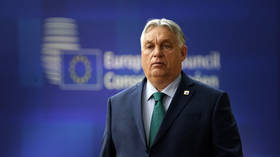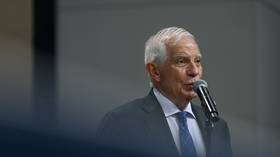Western governments are in a crisis of their own making
By blindly following the US into its proxy wars, EU leaders have triggered a backlash that threatens to bring them down
As the American Empire’s proxy wars in Palestine and Ukraine escalate, the acute state of political instability that characterises most Western democracies has – not surprisingly – intensified of late.
The United States is currently in the middle of a bitterly contested Presidential election race – with voters due to go to the polls on November 6.
Donald Trump and Kamala Harris both recently confirmed their commitment to the Netanyahu government in Israel – as it continues to kill civilians with impunity in Gaza and launch military incursions in the West Bank – and both candidates continue, somewhat less enthusiastically, to support the Zelensky regime in Ukraine.
Beneath all the obligatory ideological fervor and celebrity glitz and glamor, it is Donald Trump who has defined the character and parameters of the Presidential election.
Trump is a convicted felon, who continues to peddle his discredited “stolen election” narrative. On January 6, 2021 it was Trump who encouraged his supporters to invade the Capitol building in order to prevent his own Vice President (Mike Pence) from certifying the 2020 election result – as he was obliged to do by the Constitution. The rioters shouted “Kill Pence” and Pence and his family were ushered to safety by security guards. Trump also tried to pressure election officials into ruling that he had won the election in some states – a matter that he is currently being prosecuted for.
A decade ago a politician who had acted in this manner could not have become a candidate for president, and no major party would have endorsed him.
Trump brazenly defended his conduct in an interview this week – as he campaigns on a platform based upon transparent lies and crude insults, and promises to wreak vengeance and retribution upon his political opponents should he become president.
It is a measure of the debasement of American politics that Harris rarely refers to Trump’s transgressions against liberal democracy – because they seemingly no longer matter to most American voters. It is far more effective, so it seems, for Harris to ridicule Trump by calling him “weird and creepy.”
Although Harris has recently pulled ahead in the polls, the election result remains uncertain – because over 70 million of the 150 million Americans who bother to vote are rusted-on Trump supporters.
No matter who wins in November, the toxic political divisions that have crippled America for the past decade can only intensify. As in 2020, Trump and his more rabid supporters will not accept defeat, and he has already predicted a “bloodbath” should he lose.
Harris’ assertion that she can “unite America” is magical thinking of the most self-delusional kind.
So much for the future of liberal democracy and political stability within the declining American Empire.
In the UK, the newly-elected Labour prime minister, Keir Starmer, has now resiled from his election promise to usher in a new era of prosperity for Britain.
Just weeks after his election win, Starmer informed Britons that they face at least 10 years of austerity before the country will be able to recover from its current state of economic decline and internal division – a state of affairs that apparently escaped Starmer’s notice until after his election victory.
Notwithstanding the recent anti-immigrant riots in numerous UK cities, Starmer seems to believe that British voters will passively accept a decade of austerity and tax increases, and that Labour’s large majority in the House of Commons will protect him from their wrath.
Like Harris and Trump, Starmer remains steadfastly committed to America’s proxy wars in Palestine and Ukraine – notwithstanding the fact that many Britons are fiercely opposed to both of them.
Recent polls show that Labour’s popularity has already declined, and the large Labour backbench is growing restless – as it becomes clear that Starmer cannot deliver on Labour’s major election promises. His decision this week to cut the winter energy payment to pensioners threatens to provoke a backbench revolt.
The Conservative Party remains hopelessly divided and is yet to elect a new leader – and the candidates for leader are an unimpressive collection of political non-entities.
In such circumstances, one can expect Britons to become progressively more disenchanted with the Starmer government. Whether this discontent manifests itself in violent protests and/or increased support for Nigel Farage’s populist Reform party is as yet unclear.
In Germany political instability has gone much further than in the UK – due in large part to the dire economic effects of the conflict in Ukraine.
The popularity of the ramshackle Scholz coalition government (made up of Social Democrats, Free Democrats and Greens) has plummeted recently – and it appears certain to be thrown out of office at next year’s election, if it survives until then.
Even so, Scholz remains firmly committed to America’s proxy wars – despite massive opposition to them within Germany that has manifested itself politically in the rise of electorally successful populist parties from both the right and left.
This week’s regional elections in Thuringia and Saxony, in the former East Germany, have seen the rise of a right wing populist party (AfD) and a newly formed left wing populist party (BSW). Both of these parties strongly oppose Germany’s involvement in the conflict in Ukraine, as well as mass immigration.
The AfD obtained 30% of votes in these regional elections and the BSW around 15%. The Social Democrat, Free Democrat and Greens vote collapsed completely – with these parties polling around 5% or less.
The mainstream parties have stated that they will not enter into coalition governments with the AfD – which they dismiss as a neo-Nazi organization – and this refusal, given the unpopularity of Scholz’s unstable coalition, can only lead to further political instability.
Whether the AfD and the BSW poll as well nationally and in West Germany is unclear – but it is clear that these parties now constitute a significant political force in Germany.
Scholz described this week’s election results as “worrying” and condemned what he termed “right wing extremists” for “weakening the economy, dividing society and ruining Germany’s reputation” – all criticisms that can, of course, be legitimately levelled at Scholz’s own inept coalition government.
Meanwhile France has been plagued by months of political paralysis – as President Emmanuel Macron has stubbornly refused to appoint a prime minister after the recent national election.
That early vote, foolishly called by Macron, saw the vote of centrist parties collapse, together with the rise of a new radical left-wing block and significant ongoing electoral support for the right-wing National Rally.
Macron’s party, the new left coalition and the National Rally each attracted around 30% of the vote – thereby creating a divisive political stalemate in the National Assembly.
Macron has refused to name a prime minister from the left and late this week belatedly appointed elderly conservative politician Michel Barnier.
Political instability in France is now certain to intensify, because the left-wing coalition block refuses to accept Barnier as a legitimate prime minister – one leader of the block having already accused Macron of “stealing the election” by appointing him.
Nor is it clear that Barnier can cobble together a viable government or even survive a no-confidence motion.
In Australia, the Albanese Labor government, governing with a slim two-seat majority, has become increasingly unpopular over the past two years and is due to face an election early in 2025.
Albanese’s unwavering support for the Netanyahu government has caused deep divisions within the Labor Party and has caused Muslim voters – who are a sizable minority in a number of crucial Labor held seats – to desert the party.
In Australia no populist party of any significance has yet emerged, and next year’s election will probably result in a hung parliament – with a minority Labor government the most likely outcome. This can only result in ongoing political instability.
The following general conclusions can be drawn from the above analysis:
- politics in the West is becoming increasingly unstable and dysfunctional due to the collapse of traditional centrist parties and the rise of populist parties on the right and left.
- this political realignment has been caused by the emergence of a globalized economy based upon renewable energy and technological change deriving from the internet.
- this economic revolution has resulted in the economic and social displacement of the traditional working class and segments of the older middle class – and given rise to fierce ideological conflicts in the West.
- these developments have been led and controlled by global elites – that, unlike the more progressive elements of the ruling elites that they have replaced, are unwilling to share their extreme wealth or incorporate those groups that they have displaced into the new society that they have created.
- these global elites refuse to acknowledge as legitimate any form of discontent with or opposition to – either ideological or political – the new world order that they control and lavishly benefit from.
- these global elites uncritically and fervently support the American Empire’s misguided proxy wars – as do the politicians that cravenly do their bidding, including Harris, Starmer, Scholz, Macron and Albanese.
- the negative effects of global elite policies and their neo-totalitarian ideologies have generated a powerful populist political backlash that has led to ongoing political instability.
- contemporary political leaders in the West are fourth-rate politicians – think of Liz Truss – who are simply incapable of dealing with the acute political and economic problems that global elite policies generate.
- politics in the West has become an exercise in ongoing crisis management.
It is true that populist political leaders do not have viable solutions to the fundamental problems that confront Western liberal democracies – but in taking a strong stance against the American Empire’s proxy wars some populist politicians in Europe are, paradoxically, attempting to inject some much-needed rationality into politics in the West.
Whether that attempt will succeed is very much an open question.
The statements, views and opinions expressed in this column are solely those of the author and do not necessarily represent those of RT.








Comments are closed.